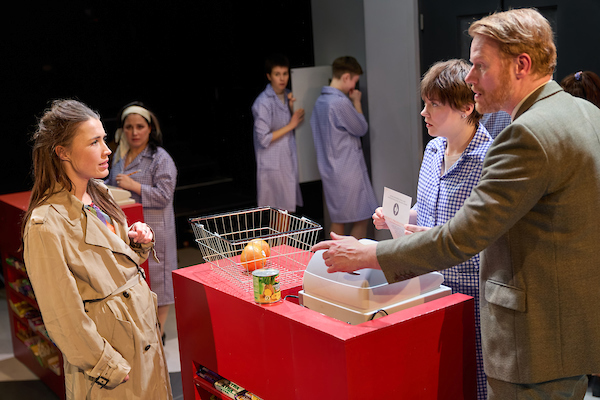
Ardent Theatre Company presents
Strike! by Tracy Ryan
The Large Theatre, Southwark Playhouse, 77-85 Newington Causeway, London SE1 6BD
Mon-Sat: 19:30, Tues & Sat: 15:00
Running Time: 90 minutes, 13th April-6 May 2023
Ticket Prices: £28.50/£23 Concession/All Previews £16
DUNNE’S Stores, Dublin, July 1984: A South African grapefruit starts something that will take nearly three years to finish …
So says the publicity for this must-see entertaining political play performed by a talented and enthusiastic young cast.
The play opens with young woman shop assistants getting ready for work in a scene full of repartee and humour.
Their union rep Karen (Jessica Regan) hands out a directive passed by the Irish Administrative and Distributive Trade Union’s (IADTU) – now known as Mandate – annual conference instructing members not to handle any South African produce in protest against the country’s apartheid policies.
One of the women comments: ‘This will piss the bosses right off.’
Later, shop assistant Mary Manning (Chloe O-Reilly) refuses to ring up a grapefruit for a customer, sticking to IADTU instructions.
Mary is immediately suspended by the store manager and it’s not long before she and eight other young women and one young man, all workers at Dunne’s, are out on strike.
In their initial uncertainty, their local union official Brendan (Paul Carrol) convinces the women and one young male worker Tommy ‘It’ll only last two weeks.’
Manager Paul (also played by Paul Carroll) tells the workers: ‘You’ll never set foot in this shop again.’
Karen replies: ‘We’ll see about that!’
Full of passion and humour, Strike! is the true story of the hardships and personal sacrifices, the friendships and camaraderie these extraordinary young people experienced as they stood up for what they believed in.
As their understanding of the suffering under apartheid in South Africa and the politics within their own government deepened, they began a journey that would change their lives, and Ireland, forever.
Initially, the local union official stated to the strikers: ‘Our general secretary supports you all the way.’
He lets them know they’ll get £21 a week strike pay.
The workers express concern about coping with the bills but their fears are alleviated with the promise the strike ‘will only last two weeks’.
It is not long before one of Dunne’s worker approaches to cross the picket line.
She is confronted by her friend but insists on going in to work, and called ‘scab’ but the union rep says ‘let her go in’.
The action moves on and we are introduced to South African union leader in exile Nimrod Sejake (Mensah Bediako).
He observes ironically that here in Ireland ‘white people repress other white people’.
Nimrod explains the exploitation and repression of black people in his country as like a pint of Guinness: ‘The white sat on the top of the black.’
He tells the picket: ‘The line you make here is the force for change.’
Opposition of the Catholic church is illustrated by one of the strikers telling the others that their ‘priest told the congregation to ignore the picket’.
The strikers carrying placards declared: ‘We support the Irish anti-apartheid movement.’
Imaginative staging uses plastic macs and hats to illustrate picketing continued in all weathers.
Karen later recounts: ‘As the weeks became months something was changing within us.’
More pressure is put on the strikers who are told to ‘go back in there oR be dismissed’.
A show of hands vote on the picket is to stay out!
As one of the strikers is facing eviction over being behind on her mortgage payments, the strike-breaker makes the excuse: ‘I’m only trying to better myself.’
The union official says he’ll help Vonnie (Doireann May White) to sort things out with her bank manager.
The strikers seek support, speaking at meetings in Liverpool, London, Glasgow and Cardiff.
They sing the union song: ‘Which side are you on?’
Karen recounts, seven months in and people are struggling to make ends meet.
The manager pokes his nose out and tries to provoke the strikers.
One picket recounts that Special Branch has been asking questions.
A dramatic stylised sequence illustrates police beating up young striker Tommy (Adam Isla O’Brien) in the early hours.
We move to the Labour Court hearing of Vonnie’s appeal against eviction.
She is brutally told to go back to work so she has a regular income to pay the bank.
She replies courageously: ‘I will not go back.’
The strikers, having listened to Nimrod, decide to visit South Africa to see apartheid for themselves.
To get the fare, they say triumphantly: ‘We raised £7,000 in one night in Dublin!’
On 9 July 1985, they recall they were held at the airport for seven hours and dreaded to think what would have happened to them if a journalist was not on the flight.
Fifteen months on, Karen gets to speak at the United Nations.
They become angry at press reports that their union general secretary is saying they should go back to work.
They are told they won’t be getting strike pay if they continue.
But Nimrod’s exile and then the Soweto uprising and massacre cements their determination to see things through.
As result of the strikers courage and determination, the Republic of Ireland became the first western country to ban the importation of South African agricultural goods on 1st January 1987.
That was hard earned by the strikers in the face of opposition from the Irish government, the Catholic Church, Dunne’s Stores and at times their union leadership.
Their strike continued until 12 April 1987.
Their principled struggle is a message for workers in Britain and Ireland today, to strike to support Palestine and boycott apartheid Israel.